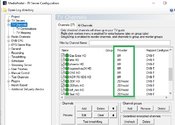I have tested it now.I have never used the "record every time on every channel" option. So at the moment it looks to me that that option is the culprit (but I have not tested this yet).
- I used my test system that I had not booted for several weeks, so the EPG was empty. I used "Refresh DVB EPG" in "Manual Control" in "TV Server Config" to grab the EPG using the idle grabber for 15 minutes (and waiting a further 20 minutes for the database updates to finish).
- I then started the MP client and scheduled 10 series using "every time on every channel". A couple of the series each had about 50 episodes in the 7-day EPG, the remainder had typically 2 to 4 episodes in the EPG.
- I then grabbed the EPG again using the idle grabber for 15 minutes.
- Before/after each step I took a screen shot of "Resource Manager" showing how much memory TV Server was using.
@Berney : If you frequently encounter this problem, all that I can suggest is that you try changing some of the settings and seeing what effect they have; e.g. disable the timeshift grabber and use only the idle grabber for a day or two, and then reverse those settings and try that for a day or two.
It would be useful to identify the cause of this problem, even if currently there is no one available to fix it.
-- from CyberSimian in the UK

 United Kingdom
United Kingdom
